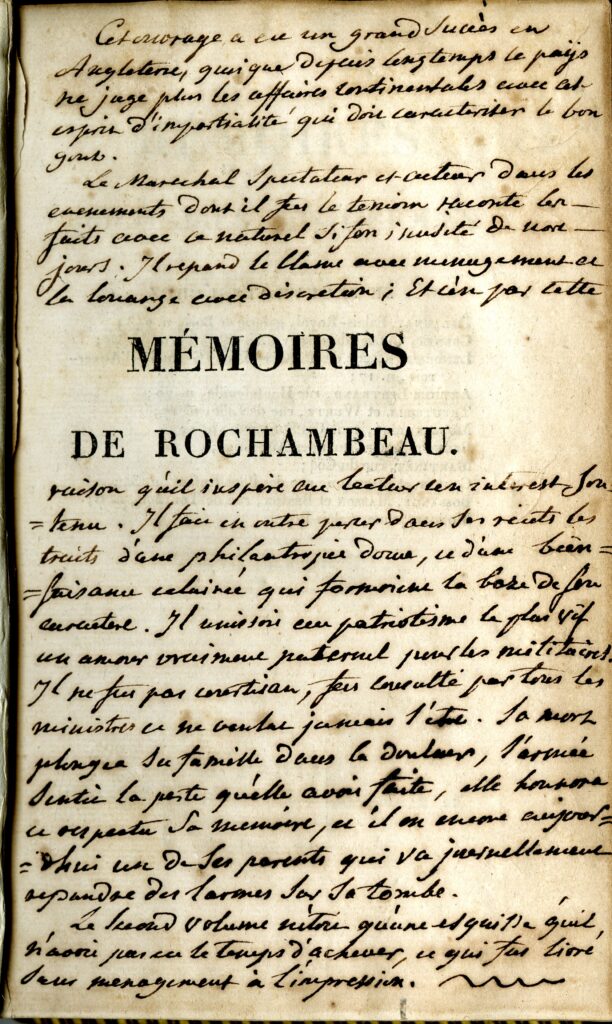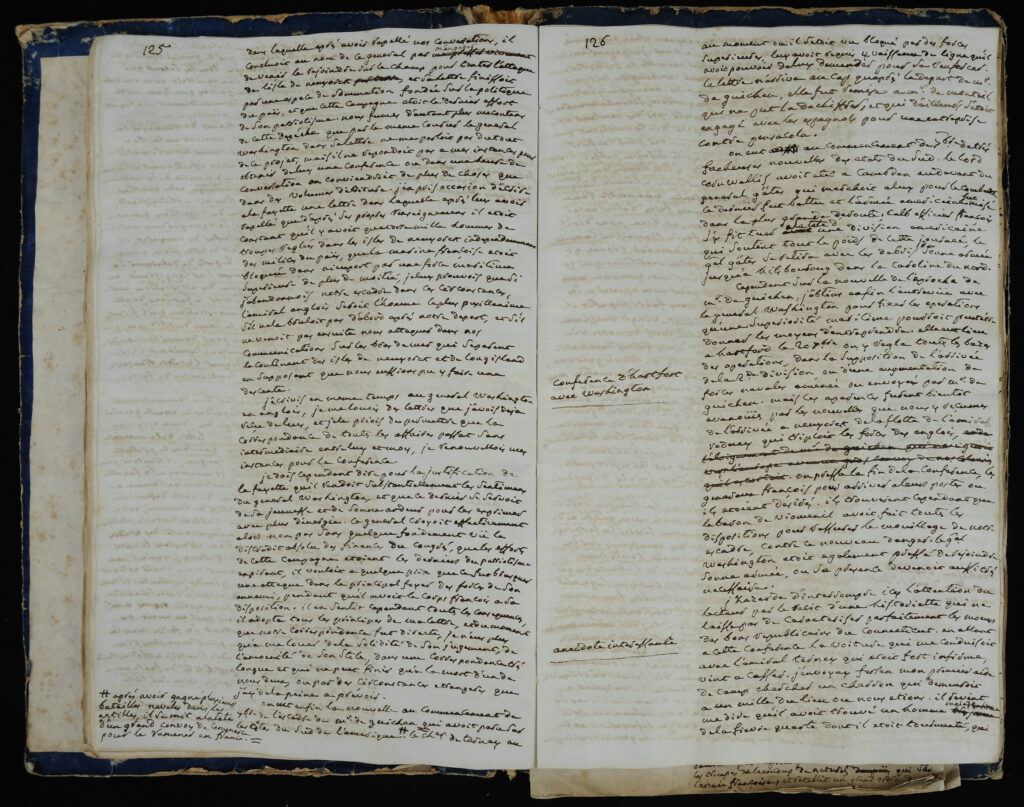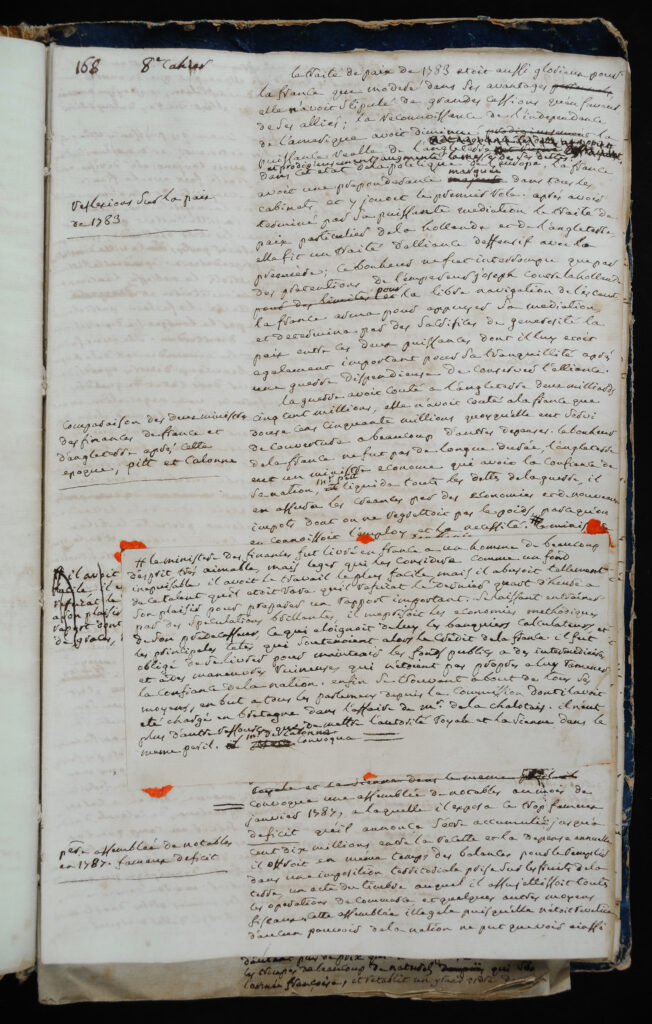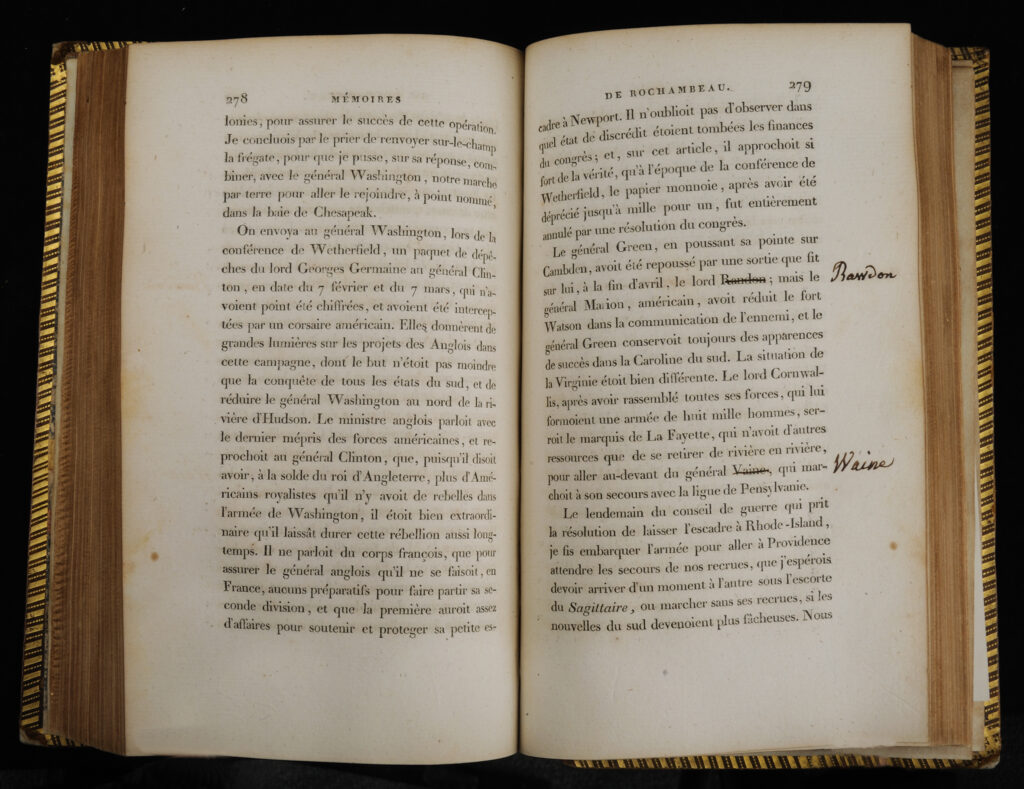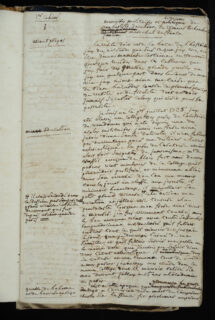
The first page of “Manuscript des memoires politiques et militaires du Marechal de Rochambeau” begins with an “avant propos” [foreword] in which Rochambeau warns his readers that they may find omissions in his accounts of the wars in which he served, because he is only writing about what he personally witnessed and knows to be the truth.
The first to arrive was the 350-page bound manuscript written entirely in Rochambeau’s own hand, the gift of members of the Rochambeau family in 2016. Then, just a few months later, the Institute, with the generous support of a private foundation, won at auction in France a copy of the published edition of Mémoires Militaires, Historiques et Politiques de Rochambeau, issued two years after Rochambeau’s death, which bears notes and corrections by his son Donatien.
The published Mémoires and the original manuscript upon which it is based provide a detailed account of Rochambeau’s military and political career, from his education and early service during the War of Austrian Succession right up to the month of his death in May 1807. Jean-Baptiste-Donatien de Vimeur de Rochambeau was born in Vendôme in central France on July 1, 1725, the third and only son to survive to adulthood of Joseph Charles de Vimeur, marquis de Rochambeau, and his wife, Marie-Claire-Thérèse Bégon. His ancestors on both sides were distinguished military and naval officers. His father served as governor of Vendôme and grand bailiff of the region, and his mother had been governess to the children of the duc d’Orleans. Although the young Rochambeau initially studied for a career in the church, winning a prize in Latin, the death of his older brother changed his destiny. At age fifteen, he enrolled in a military academy in Paris, setting off on a career path that would define the next seven decades of his life.
As a young officer of the cavalry, Rochambeau served in Bohemia, Bavaria and on the Rhine during the War of Austrian Succession, rising to the rank of colonel by age twenty-two. He was wounded by grapeshot at the battle of Laufeldt leading his regiment in a charge against the center of the enemy’s line, and the following year he fought gallantly in the siege of Maestricht. In 1749, at age twenty-four, he married Jean-Thérèse de Costa, daughter of a wealthy family of Portuguese origins. Their son, Donatien, who would follow his father in a military career, was born in 1755.
With the outbreak of the Seven Years’ War, Rochambeau returned to action, serving with distinction at Minorca and in the European theatre, and he was promoted to major general of the infantry. After returning home in 1763, he took an active interest in improving the quality of military education in France, organizing training camps where, drawing on his own experience in the field, he instituted innovations in tactical exercises and maneuvers. In 1771, Louis XV awarded him France’s highest military honor, the Grand Croix de St. Louis.
More than fifty pages of Rochambeau’s manuscript are devoted to his experience as commander of the French expeditionary forces sent by Louis XVI to aid the fight for American independence. Rochambeau opened this chapter of his memoir with a description of the “most awful crisis” America faced in 1780: “She had contended by herself against the entire forces of England since the commencement of her revolution. The more she had struggled, the less able she was now to hold out. The Congress, in this critical situation, resolved to solicit from her ally the King of France further assistance, by a fresh supply of naval and land forces and money, which the latter accordingly granted…. The Chevalier de Ternay was appointed to the command of the squadron, and I to that of the troops which the king had been pleased to send out to the succor of his ally. On my observation of the inability of so small a body of men as was placed under my command to act efficiently at so great a distance, their number was immediately doubled.…” [Note: The English translations of passages from the Mémoires are from W.E. Wright, Memoirs of the Marshal Count de Rochambeau Relative to the War of Independence of the United States (Paris: At the French, English, and American Library, 1838).]
The French fleet, carrying an army of some 5,800 officers and men under Rochambeau’s command, sailed from the port of Brest in early May 1780, arriving in Newport, Rhode Island, in mid-July. As the French forces set up camp and fortified the island, Rochambeau described what he called a “tracasserie” [petty quarrel or annoyance] in his early communications with General Washington. Because of the language barrier, Washington relied on Lafayette to convey his orders to Rochambeau, and the seasoned French general was clearly offended by young Lafayette’s enthusiastic assumption of authority in writing to him. Rochambeau moved quickly to correct the situation: “I wrote … to General Washington in English; I expressed myself grateful for the letters I had received from him, and begged that he would in the future allow my correspondence with him, on all matters, to be direct, without the interference of a third person….”
It was almost a year later that Rochambeau and Washington finally came together to plan their combined attack on the British—first setting their sights on New York but then, after the arrival of Admiral de Grasse’s fleet off the Chesapeake Bay, marching together to Virginia to entrap Cornwallis’s army at Yorktown. At the surrender ceremony, Gen. Charles O’Hara, representing Lord Cornwallis, tried to present the British commander’s sword to Rochambeau, who in turn pointed him in the direction of the commander in chief, General Washington. In recognition of Rochambeau’s service to the United States, Congress issued a proclamation of thanks and presented to him two cannons taken from the British. Rochambeau returned to France in 1783 to become a founding member of the French branch of the Society of the Cincinnati. His son, Donatien, who had served as his father’s aide-de-camp in America, also joined the Society.
Toward the end of his chapter on the American Revolution, Rochambeau described the events of the last year of the war that cemented his lasting admiration for George Washington:
An insurrection broke out amongst the troops, who persisted in maintaining themselves as a corps, in status quo, until the amount of [their] pay should be acquitted in full …. General Washington, with that noble and patriotic character which ever formed the basis of his conduct, used his influential power over the minds of his soldiers to bring them round to those feelings of generosity with which they had been animated in the whole course of the Revolution. It was at his instigation that the Cincinnatus association was proposed to commemorate the alliance of France, as an indissoluble bond of their mutual fraternity, and an honorable mark of their service. Having at last accomplished the disbanding of his army, he took leave of his military career by a letter which depicts with admirable precision the character of this great man, and which will certainly be handed down to posterity in the history of every country.
Louis XVI appointed Rochambeau maréchal de France in 1791. He commanded the Army of the North during the early years of the French Revolution, but he was arrested during the Reign of Terror in 1794, and narrowly escaped execution. Pleading his case to the court, the general who had fought for liberty on two continents wrote: “I cannot believe that in this era of equality a former aristocrat has no rights except to march before the scaffold before anybody else, and to be the last man to be allowed to prove his innocence. Those are not the principles I learned from Washington, my colleague and my friend, when we were fighting side by side for American independence.” He was released some months after the execution of Robespierre and returned home to his family. Napoleon Bonaparte would later reward him with a pension and the Legion d’Honneur. The much-decorated war hero lived out his last years at his château on the banks of the Loir, a retirement that was marred only by a separation from his son.
After returning from America, Donatien de Rochambeau had also continued in the military, serving in the Caribbean in the 1790s. In 1802 he was appointed to lead an expeditionary force against Saint Domingue (now Haiti) to attempt to restore French control during the Haitian Revolution. His brutal tactics instead united the black population against the French, and General Rochambeau surrendered to the Haitian commanders in November 1803. As he sailed towards home, he was captured by a British squadron and sent to England as a prisoner on parole, where he would remain interned for nine years. He never again saw his father, who died at home at age eighty-one on May 12, 1807.
One biographer suggested that Rochambeau began writing his memoir while in prison in the 1790s, but the depth of detail in the text suggests that this was the project that absorbed him through his last years, in retirement at home at the Château de Rochambeau. It was there in his study, overlooking the Loir River, that he would have had access to his voluminous papers, books and maps accumulated over a lifetime of service to his king and country that would inform his work.
Rochambeau’s original manuscript memoir is organized into seventeen cahiers (or gatherings), each created from five or six large sheets of paper folded once and sewn together to create twenty or twenty-four pages on which to write. The type of paper of which the individual cahiers are made varies a little in quality, color and size, suggesting that this monumental work was put together over time. Each cahier begins as a new chapter or period of Rochambeau’s long life, and the fact that some of the cahiers have blank pages at the back suggests he might not have worked on his memoir in strict chronological order but gathered the cahiers together and numbered them at the end. These blank pages may also suggest that in some cases Rochambeau intended to revisit or expand certain sections.
The handwriting is unmistakably Rochambeau’s throughout, and it becomes denser and harder to read towards the end. The pages are laid out in a style typical of French manuscripts of the period, with a very generous left-hand margin on each page. Rochambeau used this margin to make notes—some serve as an index to highlight dates and important events; other notes expand on the points made in the main text. Rochambeau clearly reviewed and edited his own work over time. There are places where whole sections are crossed out and, in a few instances, where a separate manuscript has been pasted with sealing wax on top of (and obscuring) the original text. The latest reference to a date within the text is April 1807, just one month before Rochambeau died—evidence that he was working on the manuscript up to the very end of his life.
It is clear in the way the manuscript was laid out that Rochambeau was writing for eventual publication—his first page of text is titled “avant propos” or foreword. But his last will and testament, drawn up in July 1805, betrays his own confidence that his work was polished enough to appear in print. In a final request, he wrote, “I beg my friend, Monsieur Coste, chief physician of the sick and the poor, to undertake the reading and correcting of these memoires, from the point of view of their defects in style, and to have them printed with care under his supervision. I leave to my wife the matter of showing him some mark of my gratitude.” Coste was an especially appropriate choice for the task, having served under Rochambeau as the chief physician to the French expeditionary forces in America in 1780, and remaining a close friend and confidant through the rest of his life.
But Coste did not become the editor of Rochambeau’s work. Following her husband’s death, Madame de Rochambeau engaged the services of Luce de Lancival, a well-known poet and playwright, to prepare the manuscript for publication. The two-volume edition of the Mémoires was published in Paris two years later, in 1809. Comparing the original manuscript to the published edition, it is clear that Luce de Lancival did very little editing, leaving the text largely as Rochambeau had written it. As he explained in his editor’s note, “This is not the work of a professional writer… In other books one looks for and desires ornaments of style; in this one, drawn on by the very interest in fact, one thanks the writer for having forgot himself entirely in thinking of nothing but the truth.”
Rochambeau’s son, Donatien, who was still a prisoner of the British when the book was released, may well have first seen it in England. Toward the end of the second volume, Rochambeau wrote of his distress over Donatien’s captivity, describing the letter he imagined writing to Lord Cornwallis reminding his old adversary of the fair and decent treatment the British received after their surrender at Yorktown.
On the half-title of volume one of his copy of the published Mémoires, Donatien wrote the following inscription:
This work has had a great success in England, even though for a long time the country has not judged Continental affairs with this spirit of impartiality that must characterize good taste.
The Marechal, as witness and author of the events, recounts the facts with a simplicity so rare these days. He spreads the blame with restraint and praise with discretion; and it’s for this reason that he inspires in his readers a sustained interest. He also pinpoints in his narrative examples of a gentle generosity, and of an enlightened beneficence that forms the basis of his character. He rallies the strongest patriotism, a true fatherly love for his soldiers. He did not court favor, was consulted by all the ministers, and never wanted to be one. His death plunged his family into sadness, the army felt the loss and honored and respected his memory; and still today there is one of his relatives who comes daily to weep at his grave.
The second volume isn’t but a sketch that he did not have the time to finish, and it was published without much editing.
Donatien also made small manuscript notes throughout the text, mostly corrections of the spellings of proper names of the officers and places he knew from his service in America. The younger Rochambeau was not released from prison until 1811—and he had only a brief time at home before he went to war again under Napoleon. He was mortally wounded at the Battle of Nations and died at Leipzig in October 1813, at the age of fifty-eight.
The expository quality of Rochambeau’s work that the editor and son so admired was criticized by others. In 1817, Robert Walsh, Jr., translated the sections on the American war into English for his journal The American Register; or Summary Review of History, Politics and Literature. His readers, he noted in his preface, “will not find any thing absolutely new in the extract from the Memoires of Marshal Rochambeau…. But those who feel the proper concern in our Revolutionary History, will be glad to see the narrative of the French commander merely as such, in an English dress. It was necessary to abridge it and there is some dryness in the details….”
Writing in the 1930s, a French biographer of Rochambeau, Jean-Edmond Weelen, wrote that “Modern curiosity makes us much more demanding. We would thank Rochambeau more if, without forgetting truth, he had forgot himself less. This too impersonal editing allowed Rochambeau to attach to his Mémoires the wars of the first Empire. Gentle delusion of an old man who mistook the region of his study, strewn with maps, for a battlefield!”
A more generous assessment came from W.E. Wright, who produced a more complete English translation of the section of Rochambeau’s memoirs on the American War for Independence, which was published for the French, English and American Library in Paris in 1838. The object of his translation, Wright wrote in his preface, was “to make known to the Americans a narrative so highly honourable both to them and to France; and at the same time, to explain and show, in their proper light, the difficulties of the celebrated campaign of 1781, which decided the triumph of independence in the United States.”
Explore more journals of French officers of the American Revolution in our exhibition Revolutionary Reflections: French Memories of the War for America.
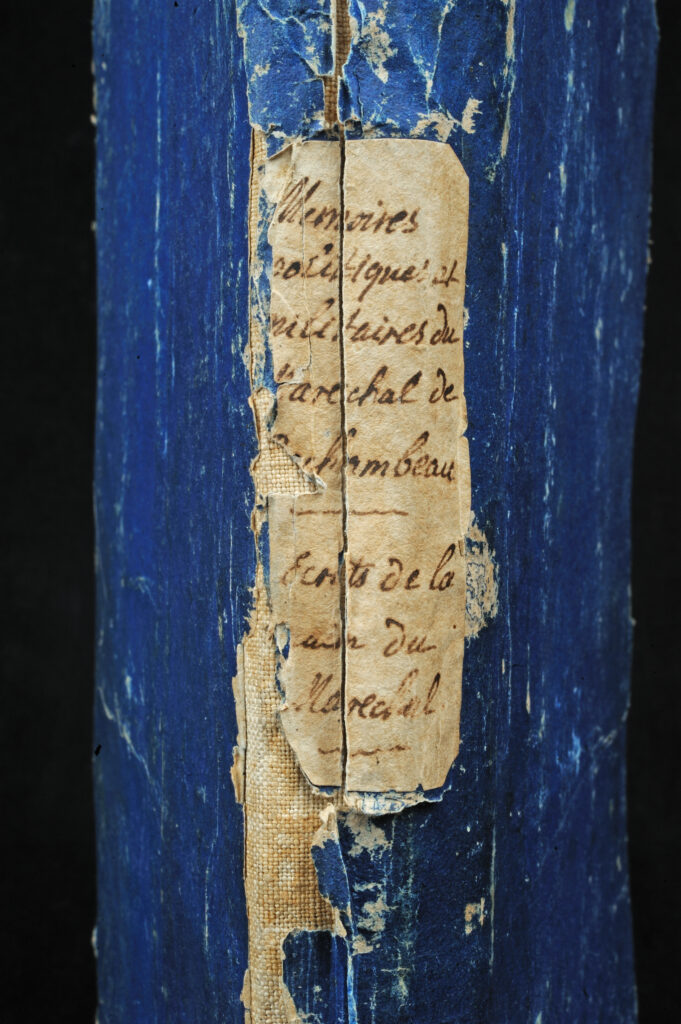
“Manuscript des memoires politiques et militaires du Marechal de Rochambeau”
Jean-Baptiste-Donatien de Vimeur, comte de Rochambeau
Covering the period 1725-1807The Society of the Cincinnati, Gift of the Rochambeau family, 2016
The original manuscript of Rochambeau’s memoir is bound in contemporary blue paper-covered boards. The manuscript spine label reads: “Memoires politiques et militaires du Marechal de Rochambeau Ecrits de la main du Marechal.” [The Political and Military Memoirs of the Marechal de Rochambeau written in the hand of the Marechal.]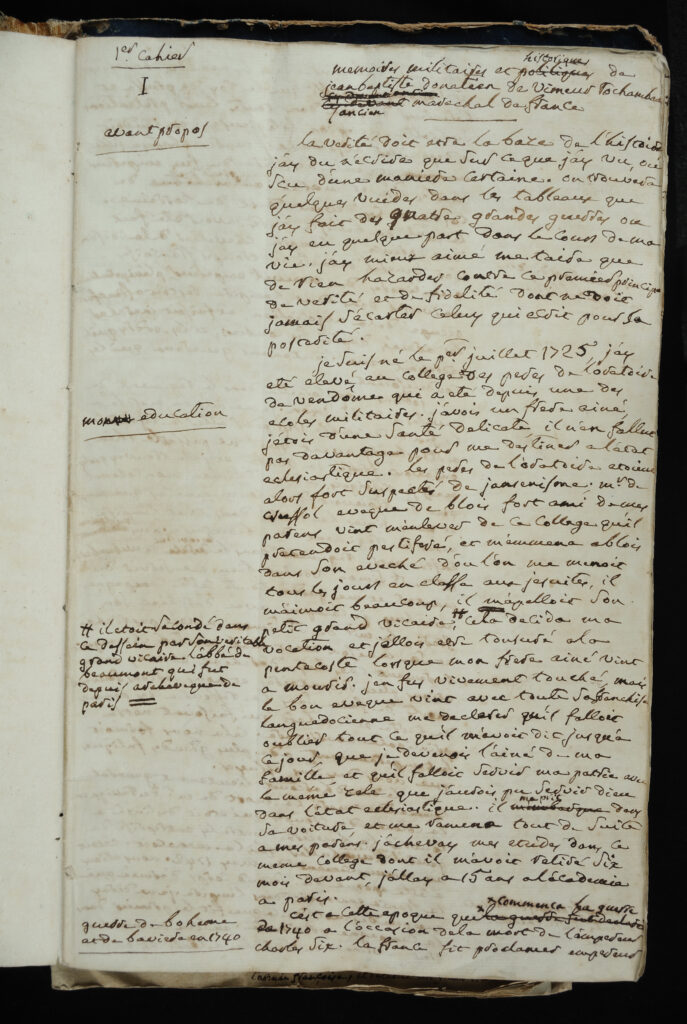
Page 1 of “Manuscript des memoires politiques et militaires du Marechal de Rochambeau”
The first page of the manuscript begins with an “avant propos” [foreword] in which Rochambeau warns his readers that they may find omissions in his accounts of the wars in which he served, because he is only writing about what he personally witnessed and knows to be the truth.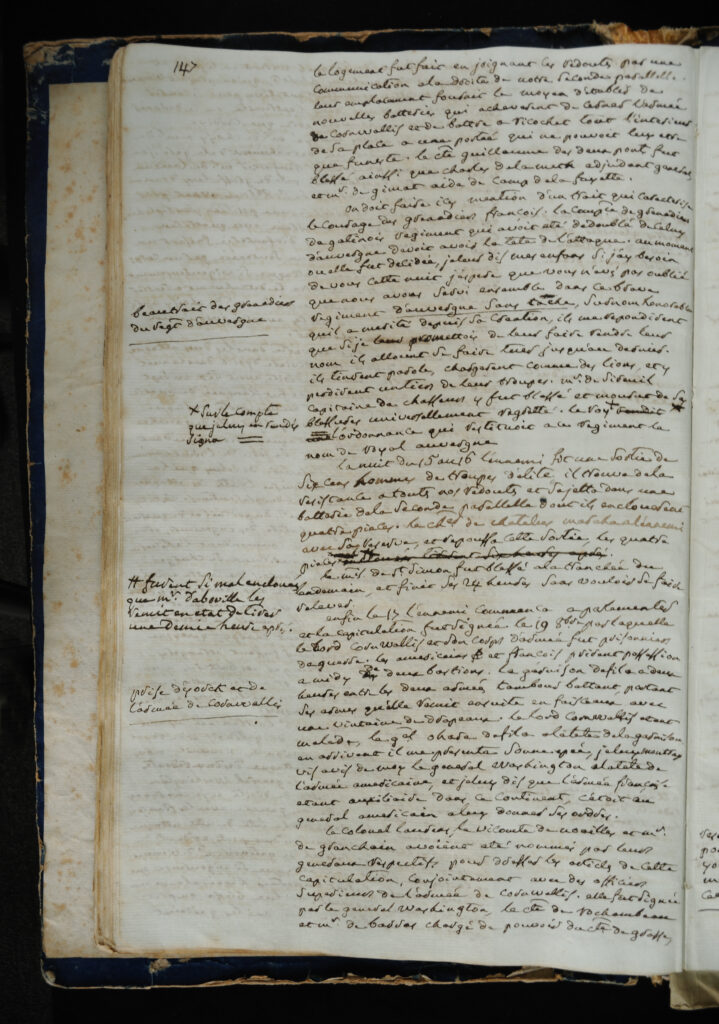
Page 147 of “Manuscript des memoires politiques et militaires du Marechal de Rochambeau”
Describing the British capitulation ceremony at Yorktown, October 19, 1781, Rochambeau writes: “Lord Cornwallis being sick, General O’Hara filed off at the head of the garrison. As he came up to where I was standing, he presented his sword to me; I pointed to General Washington, who stood opposite to me at the head of the American army and told him that the French army being only an auxiliary on this continent, it devolved on the American General to tend him his orders.”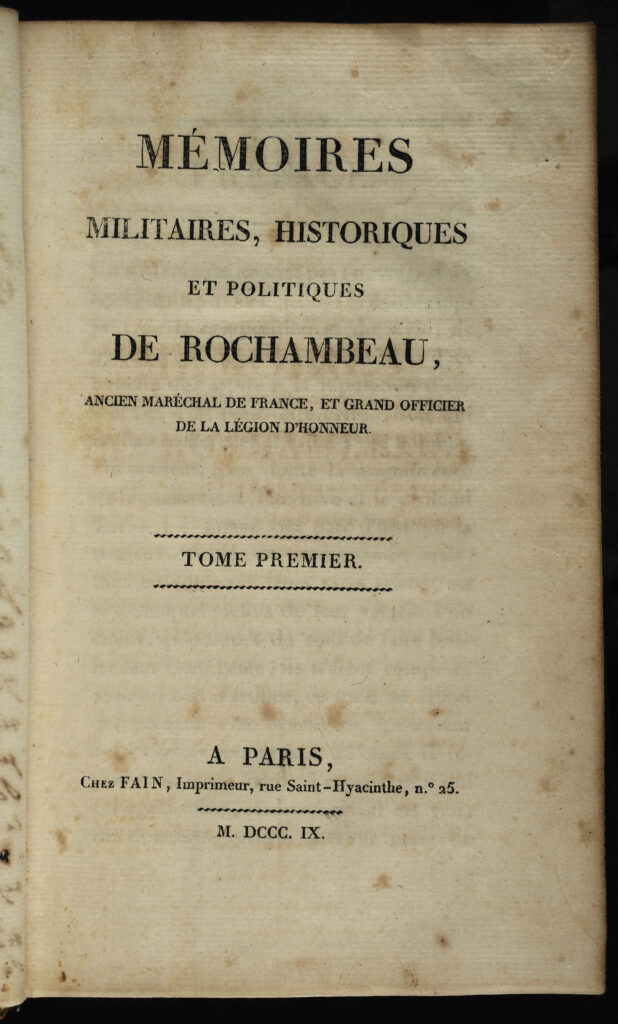
Mémoires Militaires, Historiques et Politiques de Rochambeau
Jean-Baptiste-Donatien de Vimeur, comte de Rochambeau
Paris: Chez Fain, imprimeur, 1809The Society of the Cincinnati, Purchased with a gift from a private foundation, 2016
Title page of volume one of Mémoires Militaires, Historiques et Politiques de Rochambeau, edited by Luce de Lancival (Paris: Chez Fain, 1809).